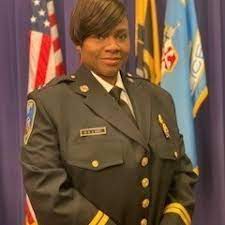Meet Major Danita Boyd, Northwest Baltimore Police Department

Q: Hello, Major Boyd. Please introduce yourself to our readers and tell us what brought you to law enforcement?


Q: Hello, Major Boyd. Please introduce yourself to our readers and tell us what brought you to law enforcement?

Baltimore’s aging public schools are frequently in need of major renovation or rebuilding. When this occurs, the student body and faculty are usually moved to a separate facility for the duration of the construction work. The temporary facility is known as a “swing school.” In our community, the swing school is Northwestern High. Northwestern has been used as a swing school since it was closed as a public high school in 2017. Forest Park High School used Northwestern as a swing school in that year. Northwestern is currently being used as a swing school for Cross Country Elementary/Middle School, which is being rebuilt as a 21st Century School.

Are you mentally healthy? Of course you are! You’re (most likely) not institutionalized, are coping pretty well with everyday life (with occasional regrettable lapses), and aren’t struggling daily with some sort of severe psychological disability. This is considered doing really well, and most of us would describe ourselves as pretty happy and mentally healthy.But isn’t it sad, truly sad, that this passes for mental health? What a low bar we’ve set for ourselves! If we can function normally, we’re mentally healthy, right? Is this the tzelem Elokim we’ve been promised that we are in our essence?

Over two years ago, I began a quest for happiness. I read, thought, wrote, spoke, and dreamt about happiness. With the support of the Baltimore Happiness Club, which I founded and coordinate, I worked through just about every major idea out there about how to be happy.
Happiness is a cool topic these days, and lots of people have ideas about how to achieve it, from the mystical (Eckhart Tolle) to the psychological (Martin Seligman) to the religious (Rabbi Zelig Pliskin), and just about every stop in between.
Along the way, I’ve used myself as a living laboratory, trying out techniques and doing whatever the various authors recommended to become happier (positive thinking, exercise, meditation, breathing, humor, diet, nature, self-awareness, mantra, complimenting others, you name it). As I discovered new approaches, I tried them out on myself and the long-suffering Happiness Club (is there an irony there?).
Copyright © 2012 Where What When. All rights reserved.